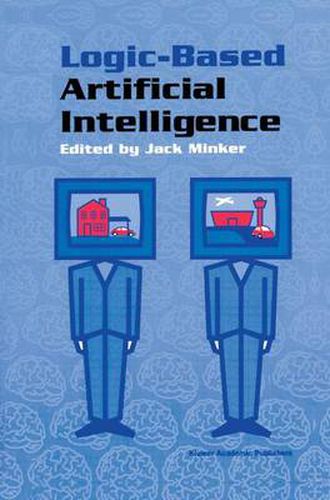Readings Newsletter
Become a Readings Member to make your shopping experience even easier.
Sign in or sign up for free!
You’re not far away from qualifying for FREE standard shipping within Australia
You’ve qualified for FREE standard shipping within Australia
The cart is loading…






This title is printed to order. This book may have been self-published. If so, we cannot guarantee the quality of the content. In the main most books will have gone through the editing process however some may not. We therefore suggest that you be aware of this before ordering this book. If in doubt check either the author or publisher’s details as we are unable to accept any returns unless they are faulty. Please contact us if you have any questions.
The use of mathematical logic as a formalism for artificial intelligence was recognized by John McCarthy in 1959 in his paper on Programs with Common Sense. In a series of papers in the 1960’s he expanded upon these ideas and continues to do so to this date. It is now 41 years since the idea of using a formal mechanism for AI arose. It is therefore appropriate to consider some of the research, applications and implementations that have resulted from this idea. In early 1995 John McCarthy suggested to me that we have a workshop on Logic-Based Artificial Intelligence (LBAI). In June 1999, the Workshop on Logic-Based Artificial Intelligence was held as a consequence of McCarthy’s suggestion. The workshop came about with the support of Ephraim Glinert of the National Science Foundation (IIS-9S2013S), the American Association for Artificial Intelligence who provided support for graduate students to attend, and Joseph JaJa, Director of the University of Maryland Institute for Advanced Computer Studies who provided both manpower and financial support, and the Department of Computer Science. We are grateful for their support. This book consists of refereed papers based on presentations made at the Workshop. Not all of the Workshop participants were able to contribute papers for the book. The common theme of papers at the workshop and in this book is the use of logic as a formalism to solve problems in AI.
$9.00 standard shipping within Australia
FREE standard shipping within Australia for orders over $100.00
Express & International shipping calculated at checkout
This title is printed to order. This book may have been self-published. If so, we cannot guarantee the quality of the content. In the main most books will have gone through the editing process however some may not. We therefore suggest that you be aware of this before ordering this book. If in doubt check either the author or publisher’s details as we are unable to accept any returns unless they are faulty. Please contact us if you have any questions.
The use of mathematical logic as a formalism for artificial intelligence was recognized by John McCarthy in 1959 in his paper on Programs with Common Sense. In a series of papers in the 1960’s he expanded upon these ideas and continues to do so to this date. It is now 41 years since the idea of using a formal mechanism for AI arose. It is therefore appropriate to consider some of the research, applications and implementations that have resulted from this idea. In early 1995 John McCarthy suggested to me that we have a workshop on Logic-Based Artificial Intelligence (LBAI). In June 1999, the Workshop on Logic-Based Artificial Intelligence was held as a consequence of McCarthy’s suggestion. The workshop came about with the support of Ephraim Glinert of the National Science Foundation (IIS-9S2013S), the American Association for Artificial Intelligence who provided support for graduate students to attend, and Joseph JaJa, Director of the University of Maryland Institute for Advanced Computer Studies who provided both manpower and financial support, and the Department of Computer Science. We are grateful for their support. This book consists of refereed papers based on presentations made at the Workshop. Not all of the Workshop participants were able to contribute papers for the book. The common theme of papers at the workshop and in this book is the use of logic as a formalism to solve problems in AI.